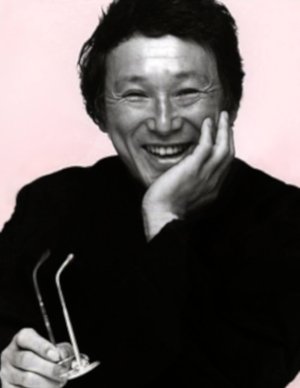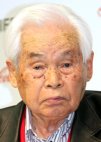Itami Juzo
- Name: Itami Juzo
- Native name: 伊丹十三
- Also Known as: Itami Juuzou, 池内岳彦, 池内 義弘, Ikeuchi Takehiro, Itami Ichizo, 伊丹 一三
- Nationality: Japanese
- Gender: Male
- Born: May 15, 1933
- Died: December 20, 1997
The son of Mansaku Itami, prewar director of satiric jidai-geki, Jūzō worked initially as an actor, appearing regularly in Japan and occasionally in English-language productions such as Lord Jim (1965, Richard Brooks). After a major success playing the father in Yoshimitsu Morita’s Family Game (Kazoku gēmu, 1983), he privately financed his first and best film as director, The Funeral (Osōshiki, 1984), a pointed black comedy following a family preparing for their father’s cremation. Though there were occasional sight gags, the main source of the comedy was incongruity: the awkwardness of people unfamiliar with established rituals, or the tactlessness of the crematorium assistant explaining the grisly details of the process to the bereaved relatives. Itami followed this film with an international hit, Tampopo (Tanpopo, 1985), in which the proprietor of a small restaurant learns to make the perfect bowl of ramen noodles, this saga unfolding alongside various sketches on the theme of food. Blending pastiche of the American Western with seasonings of pseudo-Oriental mysticism, this was actually more farce than satire, and one of Itami’s less typical films; his most lightweight work, it was, nevertheless, his funniest.
Itami’s most characteristic vein, however, was one of hectic social satire, typified by the two Taxing Woman films (Marusa no onna, 1987, and Marusa no onna 2, 1988), about a government agent pursuing tax evaders, by A Woman against Extortion (Minbō no onna, 1992), about a lawyer fighting yakuza intimidation in a luxury hotel, and by Ageman (1990), about a former geisha who brings luck to every man who beds her. All were distinguished by feisty performances from Itami’s wife and regular star, Nobuko Miyamoto. The least successful, Ageman, was an uncomfortably broad critique of political corruption and plutocratic greed. The Taxing Woman films, however, were pointed attacks on the unscrupulous rich: not only tax evaders, but also, in the sequel, construction companies breaking up neighborhoods and resorting to intimidation in the pursuit of profit. A Woman against Extortion offered a deglamorized presentation of the yakuza as brutal thugs, a portrayal which had consequences for Itami himself when he was stabbed outside his home shortly after the film’s release. This event was to inspire the director’s final work, Woman of the Witness Protection Program (Marutai no onna, 1997), an unusually grim, if still comedic, drama about a woman threatened by the cultist perpetrators of a murder she has witnessed.
Itami’s most typical films belonged to the era of the bubble economy, whose extravagances were fertile ground for satire. After its collapse, he attempted to expand his range with two relatively serious films. TheLastDance (Daibyōnin, 1993) was the story of a filmmaker diagnosed with cancer while directing a melodrama about a married couple both dying from the same disease. The contrast between the messy reality of death and the sentimentality of the film-within-a-film was effective, though the ending succumbed to the same kind of schmaltz that Itami had previously sent up. AQuietLife (Shizukanaseikatsu, 1995) was a flawed but fascinating story, based on events surrounding the family of Itami’s brother-in-law, author Kenzaburō Ōe, and particularly his mentally handicapped son; the mixture of pathos and violence was effectively handled. Less well judged, in both these films, were the intrusive fantasy sequences and elements of farce. SupermarketWoman (Sūpānoonna, 1996) returned to more characteristic territory: a failing store restores its reputation. Though engaging, it was toothless as satire; indeed, Itami seemed by now to be celebrating the commercial values he had once mocked.
Although he often used eccentric camera angles to humorous effect, Itami’s comedy derived less from style than from situation, and from the resourcefulness of his heroines in the face of adversity. His gags, especially in the Taxing Woman films, were suavely timed and slickly executed, but none of his later films equalled the gravity of The Funeral or the hilarity of Tampopo, and latterly his work became less barbed and somewhat formulaic. Mark Schilling has spoken ironically of his “ability to package his social comedies as adroitly and consistently as McDonald’s packages Big Macs.” Although Itami’s suicide was a personal tragedy, it seems likely that his best work was behind him.
(Source: A Critical Handbook of Japanese Film Directors) Edit Biography
Screenwriter & Director
| Title | Rating |
|---|---|
| Woman in Witness Protection | 7.3 |
| Supermarket Woman | 7.7 |
| A Quiet Life | 7.3 |
| The Last Dance | 6.7 |
| Minbo: The Gentle Art of Japanese Extortion | 7.5 |
| Tales of a Golden Geisha | 6.3 |
| A Taxing Woman’s Return | 6.8 |
| A Taxing Woman | 7.5 |
| Tampopo | 7.6 |
| The Funeral | 7.3 |
Drama
| Title | Rating |
|---|---|
|
Toge no Gunzo
Japanese Drama, 1982, 50 eps
(Support Role)
|
6.0
|
|
Oshidori Ukyo Torimonoguruma
Japanese Drama, 1974, 26 eps
[Narrator in Episode 1]
(Guest Role)
|
0.0
|
|
Sabaki no Ie
Japanese Drama, 1970, 13 eps
(Support Role)
|
0.0
|
|
Ranpo Edogawa series: Kogoro Akechi
Japanese Drama, 1970, 24 eps
(Guest Role)
|
6.0
|
|
Comet-san
Japanese Drama, 1967, 79 eps
Ishihara Saburo
(Support Role)
|
8.0
|
Movie
| Title | Rating |
|---|---|
|
Sweet Home
Japanese Movie, 1989,
Yamamura Kenichi
(Support Role)
|
6.8
|
|
The Making of "Tampopo"
Japanese Movie, 1986,
[Himself]
(Support Role)
|
0.0
|
|
Bumpkin Soup
Japanese Movie, 1985,
Professor Hirayama
(Main Role)
|
6.1
|
|
Choji Snack Bar
Japanese Movie, 1983,
Kawahara
(Support Role)
|
6.3
|
|
Kazoku Game
Japanese Movie, 1983,
Numata Kosuke
(Support Role)
|
7.1
|
|
The Makioka Sisters
Japanese Movie, 1983,
Makioka Tatsuo [Tsuruko's husband]
(Support Role)
|
7.2
|
|
Kidnapping Blues
Japanese Movie, 1982,
(Unknown)
|
6.9
|
|
Akuryo-To
Japanese Movie, 1981,
Ochi Ryuhei
(Support Role)
|
8.0
|
|
Shikake Hito Baian
Japanese Movie, 1981,
Omiya Sabei
(Guest Role)
|
0.0
|
|
Play it, Boogie-Woogie
Japanese Movie, 1981,
[Lawyer]
(Bit part)
|
6.7
|
|
Until Evening
Japanese Movie, 1980,
Sasa
(Main Role)
|
2.0
|
|
No More Easy Life
Japanese Movie, 1979,
Takamizawa [Landlord]
(Support Role)
|
7.0
|
|
Grass Labyrinth
Japanese Movie, 1979,
Principal / Priest / Old man
(Support Role)
|
7.4
|
|
I Am a Cat
Japanese Movie, 1975,
Meitei
(Support Role)
|
6.4
|
|
My Way
Japanese Movie, 1974,
[Dr. Takagi]
(Support Role)
|
0.0
|
|
Imoto
Japanese Movie, 1974,
Wada Kazuo
(Support Role)
|
5.5
|
|
Lady Snowblood 2: Love Song of Vengeance
Japanese Movie, 1974,
Tokunaga Ransui
(Support Role)
|
7.2
|
|
A Young Man's Stronghold
Japanese Movie, 1970,
Ishizaka
(Unknown)
|
3.0
|
|
Heat Wave Island
Japanese Movie, 1969,
Iino
(Main Role)
|
6.0
|
|
Notorious Concubines
Japanese Movie, 1968,
Hsi Men Ching
(Unknown)
|
0.0
|
|
Parole
Japanese Movie, 1967,
(Unknown)
|
0.0
|
|
Sing a Song of Sex
Japanese Movie, 1967,
Ôtake
(Support Role)
|
6.2
|
|
The Flame of Devotion
Japanese Movie, 1964,
Yoshii Takuji
(Main Role)
|
6.7
|
|
Ten Dark Women
Japanese Movie, 1961,
Hanamaki
(Support Role)
|
7.5
|
|
The False Student
Japanese Movie, 1960,
Soratani
(Support Role)
|
6.0
|
Special
| Title | Rating |
|---|---|
|
Joi no Mezameru Toki
Japanese Special, 1982, 1 eps
(Support Role)
|
0.0
|
|
Oinaru Asa
Japanese Special, 1979, 1 eps
(Support Role)
|
0.0
|
Articles
If The Woman Behind The Counter was a J-Drama
Editorials - Jul 15, 2021
Say what? What is a Czechoslovakian series from the 1970s doing on MDL?! Ebisuno92 embarks on a quest to adapt this old (but gold) TV show into the perfect J-Drama.
Underground Nightmares and Social Anxieties: Aum Shinrikyo on Film
Editorials - May 10, 2021
Ebisuno92 investigates the history and cinematic depictions of the highly controversial cult.
From Zero to Hero: A Retrospective Guide to Yaguchi Shinobu
Editorials - Dec 21, 2020
Joe Shiren and Ebisuno92 revisit the feel-good vibes of Yaguchi Shinobu's movies.






























